The Youth Research Centre in the Institute of Applied Social Sciences of Warsaw University was founded in July 1991, after the departmental Institute of Youth Problems Research [Instytut Badań Problemów Młodzieży – IBPM] was closed down in January 1991. Still, in the closing period of IBPM, a fellowship of members started organizing regular and open seminars concerning problems of youth. Dr Barbara Fatyga and Ma Jadwiga Siemaszko, who had made contact with prof. Paweł Czartoryski and Jakub Wygnański, prepared materials regarding youth for so called oppositional side of the “Round Table”. Out of this meeting additionally originated the foundation “Regardless of bad weather” [Bez względu na niepogodę], which has been cooperating with OBM since mid 1990’s. In the foundation co-existed two basic cells: data base of non – governmental organizations (J. Wygnański and his associates) and Youth Work Agency [Młodzieżowa Agencja Pracy] (which is an initiative of our colleagues: Ma Ewa Giermanowska and Ma Ewa Czarnocka, who being helped by Ma Jerzy Puchalski and Ma Wojciech Giermanowski led it generously afterwards).
In 1989 in OBM there was organized a meeting of organizations and youth groups (legal and “illegal”) out of our initiative. Since 1988 there was already conducted research of such groups using biographic narrative interviews conducted by Dr B. Fatyga, Ma Małgorzata Adamska and Ma Robert Lipka (with help of Ma J. Siemaszko and Ma Ewa Ostrowska). In another team, led by Dr Grzegorz Nowacki, there was built a register of groups and organizations of young people who were then active on public scene (it was prepared by a team of Ma Małgorzata Adamska, Ma Hanna Andrzejczyk, Ma Janusz Kowalski, Ma Joanna Kowalczewska, Dr Krystyna Narwicz, Ma Iwona Słowik, Dr Andrzej Sztylka, Ma Anna Tyszkiewicz and Dr Stanisław Wąsowicz). Additionally, prospective members of OBM team prepared several interesting research: “Młodzież Polska ‘88” [Polish Youth ‘88] (with participation of Michał Szymańczak); “Świadomość potoczna pokolenia młodych Polaków. Analiza materiałów pamiętnikarskich” [Common consciousness of young Poles. The analysis of diary materials] (B. Fatyga and J. Siemaszko); “Idea porozumienia narodowego i reform w świadomości młodzieży” [The idea of national agreement and reforms in the consciousness of the youth] (with participation of Grażyna Fluderska and J. Puchalski); “Bezpieczeństwo ekologiczne w świadomości młodzieży” [Ecological safety in the consciousness of the youth] and “Wychowanie estetyczne młodzieży szkół średnich” [aesthetical upbringing in high schools] (with participation of Marek Kłosiński), “Społeczne problemy przejścia młodzieży od nauki do pracy” [Social youth problems of transition from education to work] (with participation of E. Giermanowska) and several others. Although we presented a reasonable project of restructuring IBPM, which had been prepared together with young colleagues representing outlooks on life different than ours (Związek Nauczycielstwa Polskiego [The Union of Polish Teachers] and PZPR [Polish United Workers Party], what was not common, as in other falling institutions there was first of all “ideological fight”), it was eventually closed down.
The history of the origin of OBM is a very good example of transformations in Polish science after 1989. One of its “heroic” moments was when the team went on the unemployment benefit for half a year. In the meantime “a storm group” (Dr B. Fatyga, Ma M. Adamska and Janusz Andruszkiewicz helped by already dead prof. P. Czartoryski, prof. Hanna Świda-Ziemba, prof. Jacek Kurczewski and J. Wygnański) fought for creating of OBM. After IBPM’s closing down, the team held regular scientific meetings, first in private households, than in a tiny room (which was rendered possible by the courtesy of Anna Popowicz – government plenipotentiary of women and family of that time), and afterwards in the headquarters of YMCA. In that time there was born an idea of OBM as an institution which not only conducts interdisciplinar research on youth, but also works for the young generation of Poles and cooperates with youth environments. We came to the conclusion that our “pass to new times” would be “The Report on Polish Youth” – a bilingual publication released in 1992 due to the effort of the team and many kindly persons, but also with the help of our colleague Ma M. Szymańczak, who was then taking his leave of IBPM in order to start working with YMCA.
As OBM moved to university, its team, apart from scientific and research interests, started to participate in academic teachings on a newly born course: applied social sciences. The new place demanded a new way of functioning and setting new relations, both within the team, and with the outer environment. The team was gradually left by the colleagues who did not feel well with leading classes and who did not want to stick to “aiming at degrees” (see below: fellows). The rest agreed that:
- OBM is first of all a scientific and research team; our presence in science demands constant bringing the knowledge of youth up to date, as well as releasing regular publications;
- The team is to be consolidated by constantly hold seminars (from the beginning on Tuesdays, 1 p.m. – 3 p.m.), common work on research programmes and brand publications of OBM;
- Each member of the team has their own interests and scientific passions, not necessarily connected with youth, which we respect and endorse; currently they are expressed, among others, by one’s own classes led by us on every kind of studies (see below: fellows);
- OBM does not work for any political party, instead it is open to the needs of public administration, territorial autonomies, non-governmental organizations, schools, parents and other youth educators, but first of all – to the needs and initiatives of young generation of Poles; OBM also conducts research and expertise in cooperation with other national and international institutions.
Until the year 2004 OBM has cooperated with, among others: Ministry of National Education and Sport, Ministry of Economy and Labour, the Chancellery of the President of RP, The Office of the Physical Education and Tourism, Commissioner for Civil Rights Protection, The Ombudsman for Children in Poland, The Polish Ecumenical Council, Polish Episcopate, The State Agency for Prevention of Alcohol Related Problems, Polish Television, Polish Radio, The Polish Youth Council, The Public Opinion Research Centre (CBOS), TNS OBOP, Polish Sociological Society, Johannes Gutenberg University Mainz, The National Institute for Youth & Community Education (INJEP), Harvard University, UNESCO, PHARE, YOUTH programme, Social Dialogue programme, European Council, Academy for the Development of Philanthropy in Poland, German-Polish Youth Office (Jugendwerk), Polish YMCA, The Polish Scout Association (ZHP), Naumann Foundation (FNF), The Foundation for German-Polish Cooperation, Batory Foundation, Polish Children & Youth Foundation, SOS – Social Help Foundation, SOS Food Bank Foundation, The Institute of Public Affairs, Foundation “Regardless of bad weather” (personal union)? The Nobody’s Children Foundation (personal union), G5 Association.
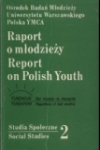
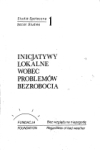
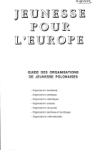 1991 – the origin of OBM-ISNS, for the first
year formally led by prof. H. Świda-Ziemba; the team, finally consisting of 17
persons, carry on working on “The Report on Polish Youth”; a part of us starts
leading evening classes on the introduction to sociology in ISNS;
1991 – the origin of OBM-ISNS, for the first
year formally led by prof. H. Świda-Ziemba; the team, finally consisting of 17
persons, carry on working on “The Report on Polish Youth”; a part of us starts
leading evening classes on the introduction to sociology in ISNS;
1992 – Formal leadership is taken by Dr B. Fatyga, to the intramural courses out of the initiative of prof. A. Jawłowska and Dr B. Fatyga there has been added a specialization “Anthropology of Contemporary Times – local activities animation”; “The Report on Polish Youth” is released, Interpress; Warsaw; we organize Polish and international conference “Social Sciences in front of the youth problems” (112 guests, among which there were people from France and Finland, young people themselves, there was an exhibition on “fanzins” and films); the team conducts research on the situation of Polish children and youth (5-20 years old) for the International Youth Foundation; we start tight cooperation with Dr Jerzy Wertenstein-Żuławski from the Institute of Culture of the Ministry of Culture, with CBOS and a youth office “Jugendwerk”; Ma Marek Kłosiński becomes a Doctor in The Institute of Psychology on Warsaw University. Dr Kłosiński cooperated with the Institute of Culture since 1992;
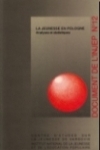
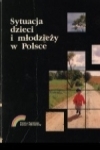 1993 – Institut Nacional de la Jeunesse et de
l’Education Populaire publishes “La Jeunesse en Pologne” (French version of
“The Report on Polish Youth”); OBM also publishes post conferencial materials
in the work edited by Dr Joanna Kośmider and Ma A. Tyszkiewicz, “Dzieci swojego
czasu. Młodzież polska i francuska” [Children of their time. Polish and French
youth], Wulkan: Warsaw; there is also released a report “Sytuacja dzieci i
młodzieży w Polsce” [Situation of children and youth in Poland], published by
The Polish Children & Youth Foundation, PFDziM: Warsaw; we make contact
with Batory Foundation;
1993 – Institut Nacional de la Jeunesse et de
l’Education Populaire publishes “La Jeunesse en Pologne” (French version of
“The Report on Polish Youth”); OBM also publishes post conferencial materials
in the work edited by Dr Joanna Kośmider and Ma A. Tyszkiewicz, “Dzieci swojego
czasu. Młodzież polska i francuska” [Children of their time. Polish and French
youth], Wulkan: Warsaw; there is also released a report “Sytuacja dzieci i
młodzieży w Polsce” [Situation of children and youth in Poland], published by
The Polish Children & Youth Foundation, PFDziM: Warsaw; we make contact
with Batory Foundation; 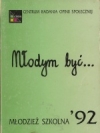 Dr B. Fatyga becomes a director of science and research
in ISNS (until 1996); CBOS publishes a book “Młodym być... Młodzież szkolna
‘92” [To be young... School youth ’92] (the co-authors are: B. Fatyga, G.
Fluderska and J. Wertenstein-Żuławski, who becomes a member of our team); Dr J.
Kośmider becomes an expert correspondent of Polish government by the Council of
Europe; a team led by Dr Fluderska and Dr Kłosiński realizes a grant on behalf
of The Task Force for Training and Human Resources Fund, what is a part of The
Council of Europe programme: 0,5. 1.1.5 Review of international partnership
cooperation of local education authorities throughout Poland.
Dr B. Fatyga becomes a director of science and research
in ISNS (until 1996); CBOS publishes a book “Młodym być... Młodzież szkolna
‘92” [To be young... School youth ’92] (the co-authors are: B. Fatyga, G.
Fluderska and J. Wertenstein-Żuławski, who becomes a member of our team); Dr J.
Kośmider becomes an expert correspondent of Polish government by the Council of
Europe; a team led by Dr Fluderska and Dr Kłosiński realizes a grant on behalf
of The Task Force for Training and Human Resources Fund, what is a part of The
Council of Europe programme: 0,5. 1.1.5 Review of international partnership
cooperation of local education authorities throughout Poland.
1994 – Dr B. Fatyga in cooperation with The SOS Food Bank Foundation conducts a PHARE project “Dzielimy się tym, co mamy” [We share what we have] (until 1997), which was performed with voluntary help of students of ISNS and MISH;
1995 – Dr J. Kośmider organizes apprenticeships and pedagogic qualifications for students of ISNS (since 2001);
1996 – OBM starts seminar work on a new book on youth inviting its friends from ISNS to cooperation (Dr Jolanta Rogala-Obłękowska and Dr Wojciech Pawlik); Dr Kłosiński starts to cooperate with Analysis and Programme Studies in Television Academy (The Programme Office at the moment) of TVP S.A.
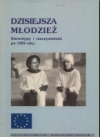 1997 – Another new collecitve publication of OBM
is released: “Dzisiejsza młodzież. Stereotypy i rzeczywistość po 1989 roku”
[Nowadays youth. Stereotypes and reality after 1989], which was granted by
PHARE funds and dedicated to the memory of our colleague and friend – Ph.D. Jerzy
Wertenstein Żuławski; Dr Fluderska and Dr Fatyga carry out research on socially
neglected children and youth in Bydgoszcz, what was financed by Academy
Educationel of Development (it is performed by students of ISNS); Dr Kłosiński
is a co-author of the Institute’s of Culture expertise: “Uczestnictwo w
kulturze młodzieży wielkomiejskiej” [Urban youth’s participation in culture];
Dr Fatyga and Ewa Łuczak publish in Polish, English, French and Russian a book
:”Dzielimy się tym, co mamy 1994-1997. O możliwościach wymiany między wsią i
miastem oraz o <teatrze dobroczynności>” [We share what we have1994 –
1997. On the possibilities of the exchange between the country and the city and
on <theatre of charity>]; a paper written by Dr Kłosiński, “Monografia
funkcjonowania kulturalnego gminy Nowogródek Pomorski” [A Monograph of cultural
functioning of a parish of Nowogródek Pomorski], which is published in a book
edited by M. Czerwiński – “Kultura lokalna. Gminy wiejskie w okresie przełomu”
[Local culture. The Country parishes in the time of transition];
1997 – Another new collecitve publication of OBM
is released: “Dzisiejsza młodzież. Stereotypy i rzeczywistość po 1989 roku”
[Nowadays youth. Stereotypes and reality after 1989], which was granted by
PHARE funds and dedicated to the memory of our colleague and friend – Ph.D. Jerzy
Wertenstein Żuławski; Dr Fluderska and Dr Fatyga carry out research on socially
neglected children and youth in Bydgoszcz, what was financed by Academy
Educationel of Development (it is performed by students of ISNS); Dr Kłosiński
is a co-author of the Institute’s of Culture expertise: “Uczestnictwo w
kulturze młodzieży wielkomiejskiej” [Urban youth’s participation in culture];
Dr Fatyga and Ewa Łuczak publish in Polish, English, French and Russian a book
:”Dzielimy się tym, co mamy 1994-1997. O możliwościach wymiany między wsią i
miastem oraz o <teatrze dobroczynności>” [We share what we have1994 –
1997. On the possibilities of the exchange between the country and the city and
on <theatre of charity>]; a paper written by Dr Kłosiński, “Monografia
funkcjonowania kulturalnego gminy Nowogródek Pomorski” [A Monograph of cultural
functioning of a parish of Nowogródek Pomorski], which is published in a book
edited by M. Czerwiński – “Kultura lokalna. Gminy wiejskie w okresie przełomu”
[Local culture. The Country parishes in the time of transition];
1998 –
1999 – Ma G. Fluderska becomes a doctor in ISNS; Dr Fatyga, Dr Fluderska and Ma Marcin Szporko conduct research for The Office of the Physical Education and Tourism, (as a result, there originates an elaborate report: „Społeczne i kulturowe uwarunkowania turystyki dzieci i młodzieży w Polsce” [Social and cultural conditions of tourism of children and youth in Poland]); Dr Fatyga defends her postdoctoral thesis in ISNS UW (a publication: “Dzicy z naszej ulicy. Antropologia kultury młodzieżowej” [Savages of our streets. Anthropology of youth culture]; in OBM there shows “juniors” – doctoral students (Ma M. Szporko);
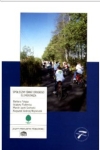 2000 – OBM works on a book about transformations of social world of youth; there
is released a collective publication: “Społeczny świat drugiego elementarza”
[Social world of the second primer], ETOH: Warsaw (co-authors: ph.D. B. Fatyga, Dr
Fluderska, Ma Marcin Sochocki); Dr Fluderska i ph. D. Fatyga receive a
scholarship of UW rector (since then Fatyga receives it annually); Ma
Giermanowska defends her doctoral thesis;
2000 – OBM works on a book about transformations of social world of youth; there
is released a collective publication: “Społeczny świat drugiego elementarza”
[Social world of the second primer], ETOH: Warsaw (co-authors: ph.D. B. Fatyga, Dr
Fluderska, Ma Marcin Sochocki); Dr Fluderska i ph. D. Fatyga receive a
scholarship of UW rector (since then Fatyga receives it annually); Ma
Giermanowska defends her doctoral thesis;
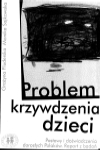
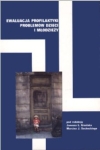 2001 – Dr G. Fluderska and Dr M. Sajkowska
publish a report: “Problem krzywdzenia dzieci. Postawy i doświadczenia
dorosłych Polaków. Raport z badań” [The problem of harming children. Attitudes
and experiences of adult Poles. Report from Research] Nobody’s Children
Foundation: Warsaw; Dr M. Kłosiński is a co-author of a monograph: “Uczestnictwo w
kulturze mieszkańców województwa zachodniopomorskiego” [Participation in
culture of citizens of Zachodnie Pomorze Province] published by the Institute of Culture; Dr Fatyga receives a post of a professor of UW;
2001 – Dr G. Fluderska and Dr M. Sajkowska
publish a report: “Problem krzywdzenia dzieci. Postawy i doświadczenia
dorosłych Polaków. Raport z badań” [The problem of harming children. Attitudes
and experiences of adult Poles. Report from Research] Nobody’s Children
Foundation: Warsaw; Dr M. Kłosiński is a co-author of a monograph: “Uczestnictwo w
kulturze mieszkańców województwa zachodniopomorskiego” [Participation in
culture of citizens of Zachodnie Pomorze Province] published by the Institute of Culture; Dr Fatyga receives a post of a professor of UW;
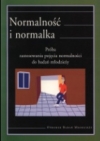 2002 – “Normalność i normalka. Próba
zastosowania pojęcia normalności do badań młodzieży” [Normality and easiness. An attempt to use the normality notion
to the research on youth] (edit. by B. Fatyga, A. Tyszkiewicz); ISNS UW: Warsaw (dated on 2001); the book has a
logo and graphic design of OBM designed by Wojciech Markiewicz;
2002 – “Normalność i normalka. Próba
zastosowania pojęcia normalności do badań młodzieży” [Normality and easiness. An attempt to use the normality notion
to the research on youth] (edit. by B. Fatyga, A. Tyszkiewicz); ISNS UW: Warsaw (dated on 2001); the book has a
logo and graphic design of OBM designed by Wojciech Markiewicz;
2003 – We start a specialization: “Anthropology of Contemporary Times – local activities animation” on extra-mural studies on ISNS; prof. Fatyga becomes a head and Dr Giermanowska and Ma Albert Jawłowski become members of a 14-person Board of Experts of the Ministry of National Education, which prepares a report “Strategia państwa dla młodzieży” [State Strategy for Youth] (the paper is accepted by the Government in August) and Polish Youth Situation Diagnosis ; prof. Fatyga and Dr M. Sińczuch together with ISNS graduates and students conduct evaluation research of the programme of The Center for Citizenship Education “A school closer to the world”; Dr Fluderska and Dr Sajkowska receive a scholarship of UW rector; Dr Kłosiński and Dr Sińczuch take part in the international workshops in Weimar “Jugend in postkommunistischen Gesellschaften – Prolifiert sich eine Generation, die Während des Umbruchs erwachsen wurde?”;
2004 – OBM works on a book concerning theories and notions used in youth research; a second seminar starts operating (for ISNS doctoral students, The Warsaw University of Technology and SNS PAN); Dr Giermanowska takes part in the international conference committed to vicissitudes of graduates on the University of Bologna
2005 - We continue our work with the jubilee publications; Prof. Fatyga, dr Sińczuch, ma I. Oliwińska, ma M.Sochocki, ma A.Jawłowski, ma T.Kasprzak, ma A.Hupa together with a group of ISNS students conduct the research for MENiS: "Conditions and possibilities of youth in the local environment in the view of youth policy of the Council of Europe". Dr Giermanowska and dr Sińczuch carry on the international cooperation in scope of research of the graduate fate. In the end of the year due to ma A. Hupa and ma G. Mańko we make a website of the specialization "Anthropology of contemporary times - local activities animation".
2006 - We publish this website; dr Fluderska starts the next cadency of the Head of extra-mural studies in ISNSU; dr Sińczuch becomes the USOS coordinator of the Institute; we prepare our 15th jubilee and new research projects.